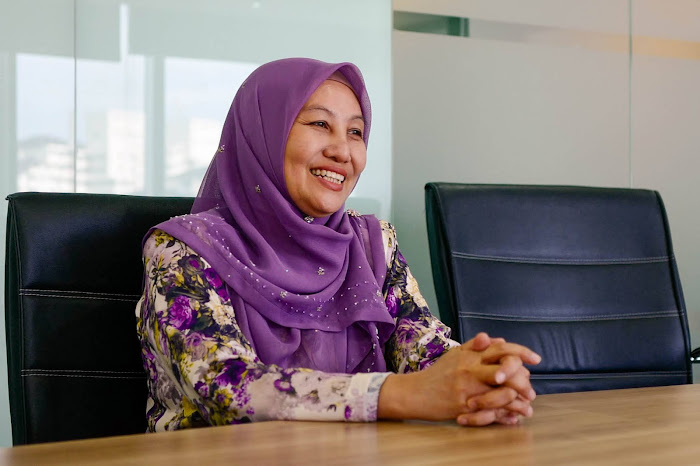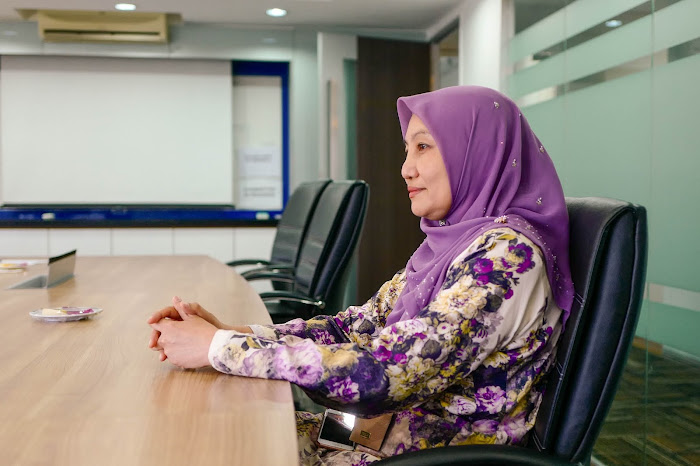In the first part of our series of food-related interviews with senior faculty members of Open University Malaysia, we spoke to Dr Aliza Ali (Chair of OUM's Cluster of Education and Social Sciences, as well as Director of OUM's Bachelor of Early Childhood Education with Honours programme) on how to motivate children to eat healthier.
EDKL: Hi, Dr Aliza! Do you have children?
DR ALIZA: I have two daughters and a son - they're grown up now. My daughters are in their twenties already!
EDKL: So you've had a lot of practice in feeding young children. Can you talk about your experience, both professionally and personally?
DR ALIZA: Most children are picky eaters. It’s very difficult to get them to eat what we want them to eat. In early childhood education, we train teachers how to encourage children to participate in food preparation and eat nutritious food. We advise teachers to conduct food parties or activities like food decoration - these are part of our course.
For my own children, I've discouraged them to take canned food and soft drinks, so I seldom buy canned ingredients. Normally I'll cook for them myself and encourage them to take fresh fruits. They must have proper portions of vegetables and fruits.
EDKL: What would be some specific tips for young children, seven years and younger?
Children learn from imitation and behaviour modelling. Parents can prepare meals together with their children, since children love participating in food preparation - they like to do what adults do. For example, children can help in preparing vegetables and fruits.
The aim is to make healthy food more attractive and to encourage them to eat it, especially vegetables and fruits, which most children avoid. We can encourage them to decorate their own meals, to make food preparation more appealing.
To offer them choices, they can prepare sushi and mix the sushi with different vegetables and fruits. We let them decide on their own style of decoration - parents should only guide.
You can also bring children to supermarkets and let them choose their own vegetables and fruits - cherry tomatoes and baby carrots, apples, oranges and grapes.
In the end, we always encourage families to eat together after preparing their own food together. Have a mix of food for a balanced preparation, based on the food pyramid.
My children have always liked Western food, like grilled chicken and spaghetti. So I taught them how to grill chicken, how to mix it with vegetables. That was the basic but best way to teach them under supervision to eat a balanced meal.

EDKL: How do you deter young children from having too much processed food?
DR ALIZA: It can be done through songs or role-playing activities. Teachers can create nursery rhymes that encourage children to eat healthy food and avoid unhealthy food. You can also do it through dramatic role-playing in preschool education.
Most kids like to go to fast food eateries like McDonald’s and Pizza Hut. You can take them there sometimes, but you need to choose appropriate meals for them.
EDKL: Health concerns are now on many people's minds. What are ways to make children more conscious of practising healthy habits in general?
DR ALIZA: You must be creative. Teachers must plan attractive lessons to get children engaged. Children’s attention spans are very short, the maximum is five minutes. That's why activities in kindergartens are play-based.
First, we have to teach them to recognise their body parts. Then, we teach them how to take care of their body and wash their hands properly. We can conduct these lessons through singing activities.
To boost their immune systems, we can encourage them to play outside. Organise outdoor activities, which are good for children's physical development, especially their gross motor skills.
EDKL: That sounds like it requires plenty of imagination and patience. Dr Aliza, you meet many teachers in your field - what are some qualities that a good teacher needs to have?
DR ALIZA: First, they must love children and they must know how children learn and grow. Basic knowledge about childhood development is very important, because these theories tell us how children develop. Learning theory tells us how they learn.
Teaching young children is not the same as teaching older ones. Most young children come to kindergarten or school because they want to play - they don’t want to learn. But their parents want them to go to learn. That’s why teachers must know how to plan lessons that children want to learn. Design programmes or activities and teach them lessons through play, without telling them that they're being taught science or mathematics. Classrooms must use materials appropriate for children’s needs and development.
EDKL: Are teachers mostly the ones interested in the education courses you offer at OUM?
DR ALIZA: For the Cluster of Education and Social Sciences, most of our courses are education-based courses. Most of our students are working adults that come from education backgrounds - there are a lot of teachers who come here. They want to pursue further education and upgrade their qualifications. We have teachers who are doing their doctorates in education and doctorates of philosophy in education. For our post-grad programme, our most popular one is the Master in Education.
Early childhood education is also one of our popular programmes. We have three programmes - Diploma, Bachelor, and Master in early childhood education. Most of our students are kindergarten operators who want to learn in-depth about early childhood education. Some of them want to become lecturers in early childhood education.
Early childhood education relates to children seven years old and below. For preschool education, we normally focus on four to six years old, before they enter primary education. These two years of schooling experiences prepare them for Primary One. We have two types of curriculum: The preschool curriculum to prepare them for Primary One, and tadika or nursery for children below four years, focusing on their overall development, their holistic development.
EDKL: What excites you about this field of education?
DR ALIZA: I’ve spent 18 years in education and early childhood education, from being a teachers' trainer to being an early childhood lecturer. I learn a lot about teachers - they’re very determined! Most of our preschool teachers might not have good qualifications, but they come here because they want to learn and upgrade themselves. They learn how to design and create programmes to run their own kindergarten and curriculum.
It’s easier if you have basic knowledge on how to assess children. What are their interests, their needs and abilities? Then you can design your curriculum based on their interests. Many teachers that come here find it difficult to teach small children, difficult to get or retain their attention in the classroom, because they don’t understand children’s specific needs.
Open University Malaysia's flexible-entry intake is currently underway, offering online programmes for diplomas and degrees in a wide variety of fields.
You can use your working experience to gain admission and graduate faster through APEL in OUM.
Read more about OUM: oum.edu.my
Read more about OUM's APEL flexible entry: apel.oum.edu.my
Sign up now: fastrac.oum.edu.my




